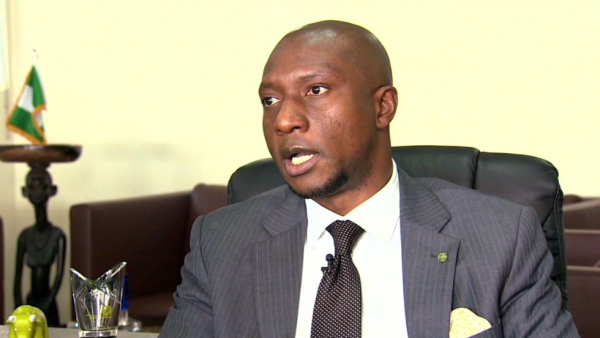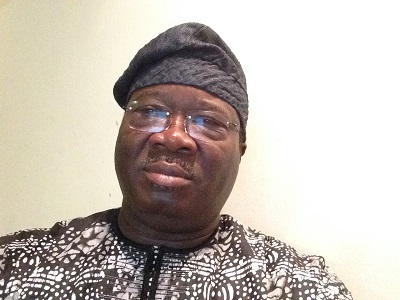The Leadership Buhari Needs In NIMASA Now-Ex NIMASA DG – John Egesi

Mr. John Patrick Egesi is the former Director General of National Maritime Authority (NMA) now Nigerian Maritime Administration and Safety Agency (NIMASA), where he implemented the national shipping policy at that time with the objective of empowering many indigenous maritime operators to fulfill the yearnings for indigenous capacity building. Currently, as the President of the Nigerian Institute of Shipping (NIS), Egesi focuses on redirecting the mandate of NIS into a repertoire of training for the much needed manpower in the Nigerian shipping industry. In this exclusive interview with MMS PLUS, he grants an expose on the inside workings of the system where he held the forte. He bares all.
What does it take to develop shipping?
You may probably have been getting straight answers to this short question. But believe me any answer short of a proper analysis is bound to mislead readers. Obvious reasons like cargo support, Cabotage Vessel Financing Fund (CVFF), etc might be sweet answers to obvious beneficiaries.
But is that really the answers? Of course not! A lot has been propagated by highly visible members of the shipping industry as well as interested amplifiers of the cargo support reservation and vessel financing fund school. For now all I can say is that the development of shipping depends on the full industrialization of Nigeria. While cargo support and CVFF will be helpful, their effectiveness can only be realized in a highly industrialized Nigeria.
How do you assess the administration of NIMASA since you left the organization?
NIMASA has been very unfortunate in the perception of the public as well as in its lack of appreciation among the ruling political class. All they see is an organization that earns its income in dollars. Nobody takes into consideration the enormous responsibilities the organization carries locally and internationally for the country.
This perception is evident in the perpetual appointment of non-staff of the Agency to head the organization as if the staffs are mere vassals, most unworthy to serve as the Director General of the place they developed and know better than the political appointees, the powers that be send to represent their interests and not that of the country.
And when these political appointees mess up the Agency in line with the unwritten directives given to them by the political class, the old loyal staff of the Agency bears the brunt of the public disfavor for a situation where they themselves are the victims. You can well imagine the negative psychological effect staffs’ non-consideration has had on the hard working staff of NIMASA.
As if the imposition of an unknowledgeable DG is not enough, the past administrations further superimpose politically appointed Executive Directors who knows little or nothing and are not interested in the objective for which the place was set up.
Some of the injustice done in NIMASA by the ruling governments has never occurred in any other place. So you can see if one says that the administration of the place has been poor, one will be fanning the embers of blaming the hardworking staff who have stake in the Agency and playing into the hands of the same people that messed the place up because they are the ones that make the decision and have people at the political arena where decisions are made.
How do you view the present day NIMASA as compared to the structure you left behind?
The present day structure of NMA, now NIMASA is the result of progressive development that started with our realization in the late 1990s that the only way we can effect proper cargo reservation principle is through some form of cabotage, hence the Cabotage Act of 2003.
We also discovered that the failure of the Nigerian National shipping Line (NNSL) – the nation’s flag carrier was not just because of lack of cargo. Our vessels failed to make the international safety standards which resulted in their sporadic arrests all over the world, hence the bringing in of the Government Inspectorate of Shipping (GIS) within the NMA in 1998 (initially called the Technical Department).
This and the Cabotage Act of 2003 is what gave rise to the present structure of NIMASA. The inclusion of JOMALIC was stretching the original effective structure to a plastic point (using a term in physics) and in my opinion was not necessary.
Again at the inception of NMA, we have always stated that the superimposition of Executive Directors on a structure that has its own departmental Directors was absolutely unnecessary.
The only function the “Executive Director” position serve has been to give powerful politicians further space to send their unqualified and inexperienced followers to head their superiors in NIMASA.
I sincerely believe that the position of Executive Directors should be scrapped to allow experienced, qualified and professional staff head their various departments. And if at all left, it should be filled from among the serving directors who have thorough knowledge of the workings and objective of the organization.
Moving away from NIMASA, what is your opinion, on having or nor having a National Shipping Line?
If one wants to be politically correct, I will quickly tell you that the old shipping line should be resuscitated with cellular container ships. Well there is a saying in Ibo that “if a son does properly investigate what killed his father, what killed the father will kill him too”.
We all know that what caused the dissolution of NNSL was not because the staff and crew could not do their jobs, or because there was no cargo for them to carry. The NNSL failed because of the destructive intrusions of the political class and their minions in the Ministry whose determination at corruptive self-enrichment gave no profitable breathing space to the beleaguered company.
With the result that their ships could not be maintained to the safety standard called for by the IMO and various Memorandum of Understanding.
Therefore until the monsters of corruptive favoritism in the appointment of the line management and command, diversions of government cargo away from NNSL, withholding of money meant for maintenance of ship are stopped, floating NNSL will be a fruitless task. Past experience has continually shown that our political masters tend to lose their grasp on economic consequences of their actions in matters of appointing their cronies to government institutions.
In your opinion, what do you think can be done to address the maladministration tendency in NIMASA?
Like I said earlier, NIMASA is a great organization both in its conception and present consolidated structure. Whatever problems NIMASA may have had, has been caused, not by the majority of their suffering staff but by the political interference through the importation by politicians of unqualified and inexperienced staff to high echelon of the organization.
These interferences have subjected most of the hardworking staff of the Agency to the same position for over 10 to 12 years while their imported juniors are effortlessly injected into positions the older staff should be occupying. The situation is very sad and sometimes tragic.
So many staffs of NIMASA have died in the past 8 years from stress-related diseases. For example since the establishment of NIMASA in 1987 that is 28 years of its existence, only my humble self has ever risen from the ranks to the position of Chief Executive – and for a very brief period, because the politicians and their journeymen had already planned my removal.
The length of stay of any NIMASA DG depends on the politician who backed the appointee. If it is the president, the DG will last for the tenure of the president. If it is those lower in the political hierarchy, the DG will last for as long as the backer is in the good books of the President.
Most of the appointees barely know their left from their right. As you can see, until these abnormalities are rectified which will restore the motivation of staff, cosmetic dispatching of a viceroy, in form of a DG, with Executive Directors, will only exacerbate the administration condition of the Agency.
So, what is your advice for the appointment of a new DG?
Very brief answer –The President should avoid the so-called Executive Directors, Avoid highly politicised staff and non-staff of NIMASA since most of the highly experienced staff are from the ranks of GL 14 – (that is those that have been in that rank for up to 9 to 12 years) and above (i.e. ADs, DDs, etc), the President should direct his search to these older staff of the organization. They will be far better than those lobbying for the position from outside the organization.







